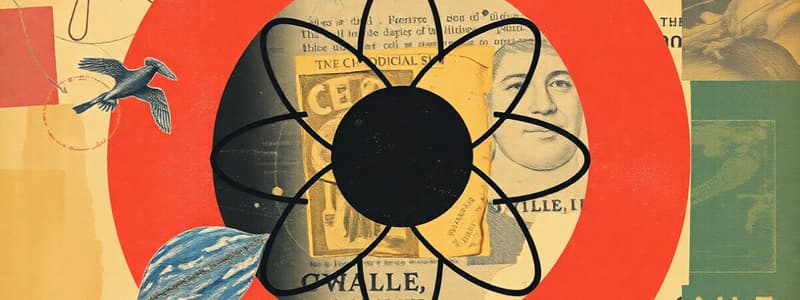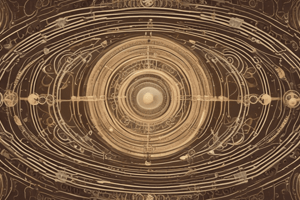Podcast
Questions and Answers
¿Qué afirmación describe mejor la visión de Leucipo y Democrito sobre los átomos?
¿Qué afirmación describe mejor la visión de Leucipo y Democrito sobre los átomos?
¿Por qué era importante el vacío según Leucipo y Democrito?
¿Por qué era importante el vacío según Leucipo y Democrito?
¿Qué idea se opone a la proposición de que el vacío es real?
¿Qué idea se opone a la proposición de que el vacío es real?
¿Cómo explicaron Leucipo y Democrito las diferencias en las propiedades de los materiales?
¿Cómo explicaron Leucipo y Democrito las diferencias en las propiedades de los materiales?
Signup and view all the answers
¿Qué limitación tuvieron las ideas de Leucipo y Democrito en su tiempo?
¿Qué limitación tuvieron las ideas de Leucipo y Democrito en su tiempo?
Signup and view all the answers
Study Notes
Leucipo and Democritus on Space and Void
- Leucipo and Democritus were ancient Greek philosophers who developed the atomic theory, proposing that all matter is composed of indivisible particles called atoms.
- Central to their theory was the concept of the void, or empty space, which they argued existed alongside atoms.
- They believed atoms were eternal, homogenous, and differing only in shape, size, and arrangement.
- This idea contrasted with prevailing views that everything was composed of four elements (earth, air, fire, and water), and that empty space was inconceivable or nonexistent. They posited that empty space was necessary for atoms to move and interact.
- Democritus, more than Leucipo, is credited describing the properties of atoms and the void as essential to explaining the physical world.
- The void, for Democritus and Leucipo, was not merely empty but was essential for the motion and change of the universe. Atoms, in this view, moved through a void, interacting with each other by colliding and rearranging.
- Their model explained phenomena like the changes in appearance of substances, and the differences in properties of materials, by proposing differences in the shapes, sizes, and arrangements of atoms in a void.
- The void, along with the atoms, was considered real and necessary.
- The importance of their ideas about the void lay not only in understanding matter, but also in the implications for theories of motion, change, and the nature of reality itself.
- Their conception of atoms and the void had significant influence on later scientific thinking, although it would take centuries for their ideas to gain widespread acceptance.
- Their speculations on the nature of space and matter paved the way for modern atomic theories.
Studying That Suits You
Use AI to generate personalized quizzes and flashcards to suit your learning preferences.
Description
Este cuestionario explora las teorías atómicas de Leucipo y Democrito, antiguos filósofos griegos. Ellos propusieron que toda la materia está compuesta por átomos y que el vacío o espacio vacío es esencial para su movimiento. Su visión contrastaba con las nociones predominantes de la época sobre los elementos y el vacío.




